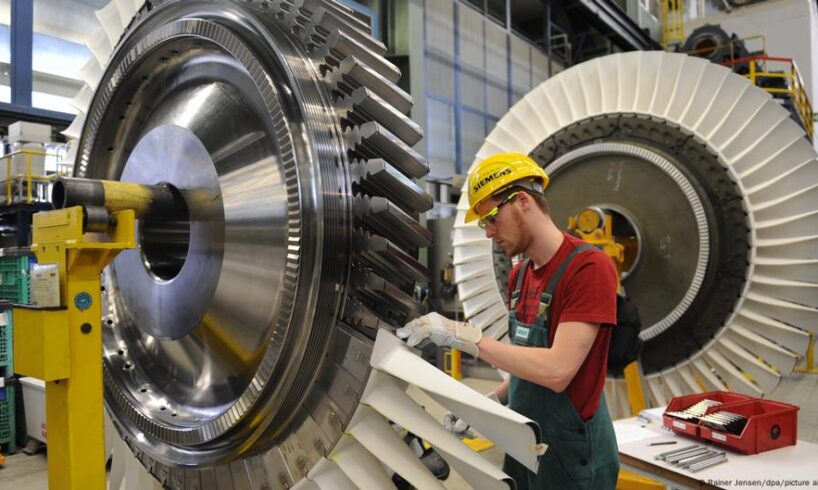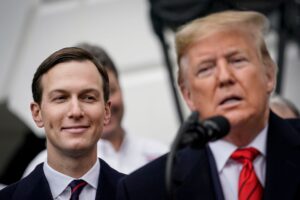
There is always an element of psychology in economics. If companies are confident they can do good business in the future, they will strongly invest. If prospects look poor, they will hold on to the money.
The COVID-19 pandemic with its collapse of international supply chains, the war in Ukraine, the subsequent energy crisis and inflation, the weakening economy in China — all took a heavy toll on the export-oriented German economy.
Economic activity nosedived. Germany slid into a lasting recession. Since then, optimism has not returned. The Organization for Economic Co-operation and Development (OECD) registered a lower investment ratio for Germany in 2024 than all other 38 member countries.
Chancellor Friedrich Merz (3rd from left), Vice-Chancellor and Finance Minister Lars Klingbeil (2nd from right) and Economics Minister Katharina Reiche (left) and 60 business leaders in the ChancelleryImage: Katharina Kausche/dpa/picture alliance
631 billion euros of investments planned
That will soon change, according to the heads of leading companies in Germany. A total of 61 of them, including corporations such as Airbus, BASF, BMW, Deutsche Börse, Mercedes-Benz, Rheinmetall, SAP, Volkswagen but also the US corporations Nvidia, Blackrock and Blackstone — have launched the initiative “Made for Germany.”
The name is reminiscent, deliberately, of the slogan “Made in Germany” which has become a symbol of quality.
Together, the corporations representing a third of the German economy want to invest €631 billion ($733 billion) in Germany over the next three years. The money will go toward new and existing factories, as well as research and development. “We want economic growth, we want to strengthen Germany’s competitiveness, we want to defend our technological leadership or extend it further,” one of the alliance’s two initiators, Siemens chief executive Roland Busch, said following a meeting of the initiative with government politicians at the chancellery.
Christian Sewing, chief executive of Deutsche Bank and co-initiator of the alliance alongside Busch, expects even more businesses to join.
“Germany is back. It’s worth investing in Germany again,” said Chancellor Friedrich Merz of the conservative Christian Democrats (CDU) after the meeting. “We stand here before one of the largest investment initiatives that we have seen here in Germany in recent decades. We are not a location of the past, but a location of the present and above all the future,” he added.
Rearming Europe means booming business for German startups
To view this video please enable JavaScript, and consider upgrading to a web browser that supports HTML5 video
Where does the new optimism come from?
The mood in the chancellery was clearly positive. However, the economic situation in Germany remains sluggish; the country is facing its third year in a row without growth. Given the tariff policies of US President Donald Trump, the outlook is anything but good.
Reviving the economy is the top priority for Germany’s new government. The coalition of the center-right Christian Democrats and Christian Social Union (CDU/CSU) and the center-left Social Democrats has been in office since early May.
They have made their first steps: The Bundestag federal parliament and Bundesrat upper house have authorized the borrowing of €500 billion ($580 billion) for a special fund for government investment in infrastructure and climate protection. Its intended focus is to whip the country’s ailing transport routes into shape, invest in energy networks, digitization and research.
Energy prices for the industry will be reduced, and businesses are set for massive tax relief. Initially, investment in production facilities, machinery, equipment, research and development will be accounted for during tax assessments. In the medium term, taxes on business are to be reduced.
A new closeness between politics and business
In Friedrich Merz, Germany now has a chancellor who himself spent many years in business. Among other roles, the lawyer formerly chaired the supervisory board of the US financial investor BlackRock.
Green transition poses risks to European steelmakers
To view this video please enable JavaScript, and consider upgrading to a web browser that supports HTML5 video
“Today we have begun a new form of cooperation,” Siemens head Busch said. “The conversation has shown that politics and business are on the same page.” Deutsche Bank CEO Sewing added: “In my view, we are experiencing a government that is moving quickly. The most important things — growth and competitiveness — are right at the top of the agenda.”
To release the announced billions, politicians should ease up on regulations and give companies more freedom, Sewing said.
Businesses are calling for reforms, especially concerning bureaucracy and social security contributions which push up the cost of labor. In Germany, employers and employees each pay half of worker contributions to health insurance, unemployment insurance and pensions. Due to higher costs for healthcare, health insurance contributions increased across the board at the beginning of this year. Contributions to long-term care insurance are expected to rise in 2026.
The burden of old-age pensions, unemployment- and health-insurance
In Germany, 42% of the gross national product goes toward social services. Pension funds are the biggest driver of this. Germany is an ageing society, and the baby boomer generation will retire from the workforce in the coming years. In addition, life expectancy is increasing. To afford the old-age pension, the government must contribute more money to the pension funds each year.
According to the OECD, reforming social insurance is the biggest challenge for Germany. If nothing changes, the government will need to keep taking on more debt to keep social systems afloat.
Chancellor Friedrich Merz has announced that reforming the social system is next on his coalition’s political agenda. Initial findings are expected in the coming months.
This article was originally written in German.
While you’re here: Every Tuesday, DW editors round up what is happening in German politics and society. You can sign up here for the weekly email newsletter, Berlin Briefing.





